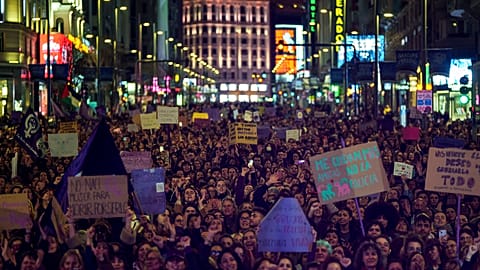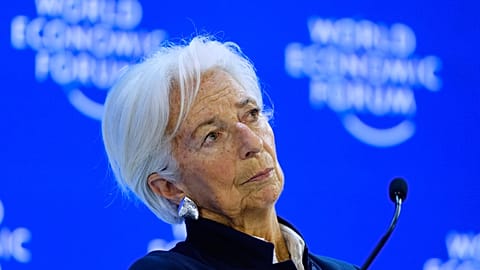In 2023, 11% of EU spending contributed to promoting gender equality. Euronews unpicks Brussels’ plans to improve those figures over the next term.
The EU’s budget is worth around €140 billion per year – and top officials are saying it needs to better focus on promoting gender equality in an upcoming overhaul.
 ADVERTISEMENT
ADVERTISEMENT
 ADVERTISEMENT
ADVERTISEMENT
Far from being gender-neutral, public spending can perpetuate, reduce or increase existing inequalities between men and women, Euronews was told.
"Gender budgeting, as it's known, aims to promote equitable spending so that taxpayers' money can identify and remove barriers that negatively affect women and girls in the EU.
The EU budget – which invests significant funds in agriculture, infrastructure and science – is due to be overhauled starting in June next year, and plans for the next seven years seem likely to strengthen gender mainstreaming, a European Commission spokesperson told Euronews.
An amendment to the bloc’s existing Financial Regulation will require that "programmes and activities should be implemented taking into account the principle of gender equality and that all performance indicator data collected for financial programmes should be gender-disaggregated where appropriate", the spokesperson added of the yet-to-be-approved plans.
That approach seems set to win plaudits from lawmakers at the European Parliament.
Further implementing gender budgeting and elevating it to the highest political level will precisely be one of the key challenges for the next term, MEP Lina Gálvez (Spain/Socialists and Democrats), chair of the Parliament's Women's Rights Committee, has previously told Euronews.
And experts have confirmed that EU spending could also play a significant role in promoting equality.
"By considering the gendered impacts of fiscal policies, gender budgeting can correct imbalances, such as unequal pay, underrepresentation in decision-making roles and limited access to services like healthcare and education," said Mirta Baselovic, spokesperson at the European Women's Lobby (EWL).
For instance, a gender-responsive budget would take into account aspects such as unpaid care work, something four in five women do every day in the EU, compared fewer than half of men. That in turn affects women's formal employment in the labour market, hence unemployment rates and overall macroeconomic performance.
With the next EU Commission set to be focused on building competitiveness, experts are keen to make the link to sound economic policies.
“Gender budgeting is good budgeting. It makes economic sense and it’s a tool to ensure gender equality in the long term,” Helena Morais, researcher at the European Institute for Gender Equality (EIGE), told Euronews.
According to the EU agency's research, addressing gender equality could help boost per-capita growth by up to 9.6% and create up to 10.5 million additional jobs by 2050.
"It is also important to ensure that the funds, or the operational programmes between the member states and the Commission behind these funds, really target women and men to achieve the agreed goals," said Morais.
However, despite a significant increase in budget spending compared to previous years, at programme level, only 11% of the EU budget spent in 2023 contributed to promoting gender equality, either as main or important objective – equivalent to around €48 billion.
To date, 13 out of 49 EU programmes, including student-exchange scheme Erasmus+, the European Social Fund+, the post-pandemic Recovery and Resilience Facility and Horizon Europe, had actions with gender equality as their main objective, the latest Commission findings show.
Horizon, the EU’s main funding programme for research and innovation, specifically requires applicants to have a gender equality plan in place to be eligible.
“Horizon Europe is the programme with the strongest gender conditionality," Gálvez noted, adding that "the reflection on gender impact that we already have in this programme should really be transferred to other funds".
But that conditionality doesn’t extend to all countries, EIGE´s researcher stresses.
"If this example would then become mandatory for all countries to ensure access to funding, then this could indeed be a practical way to implement gender budgeting in the EU's financial mechanisms," Morais argued.
There’s also a legal argument: the EU is required by its founding treaties to eliminate inequalities, including for gender, across the board, including via its financing.
The current budgetary framework, which stretches from 2021 to 2027, was designed to be more sensitive to the issue, but the full implementation of gender budgeting in all EU financial instruments is still “a work in progress," Baselovic regretted.
Gender budgeting won’t necessarily be more costly or overly burdensome, as it is about using resources more wisely, the EWL stressed.
"While it may require initial investment in training, data collection and adaptation of existing processes, these efforts will be outweighed by the long-term benefits of more equitable and effective public spending," Baselovic said.
But there’s still data to be collected and lessons to be learned before EU lawmakers get their teeth into negotiating new spending deals, Morais said. "This is a process, and we should learn from the implementation of different approaches," she added.
Jack Schickler contributed to this story.

















